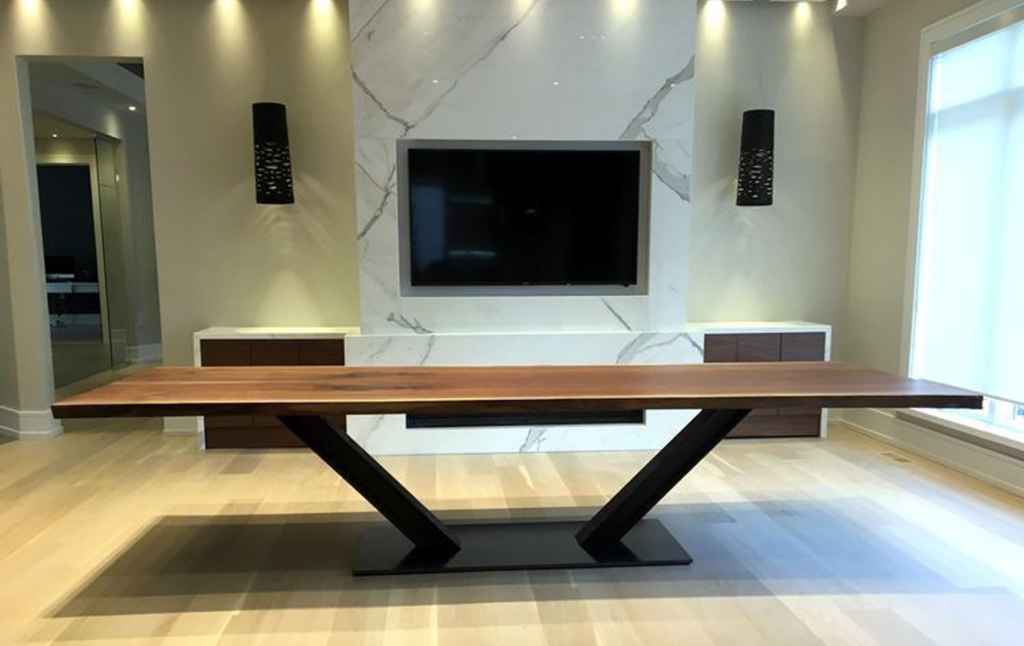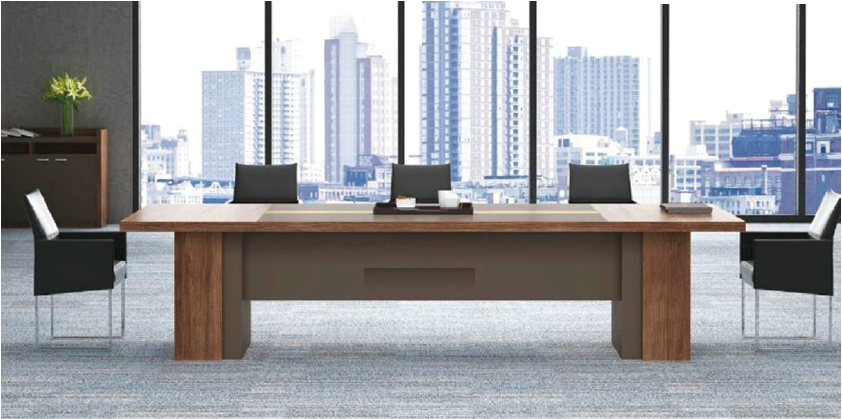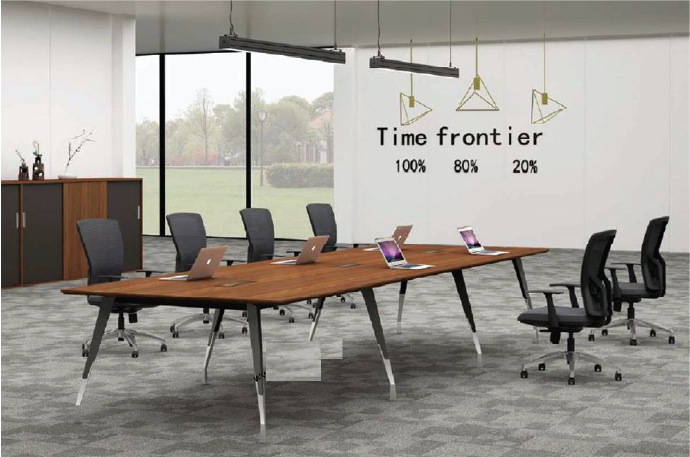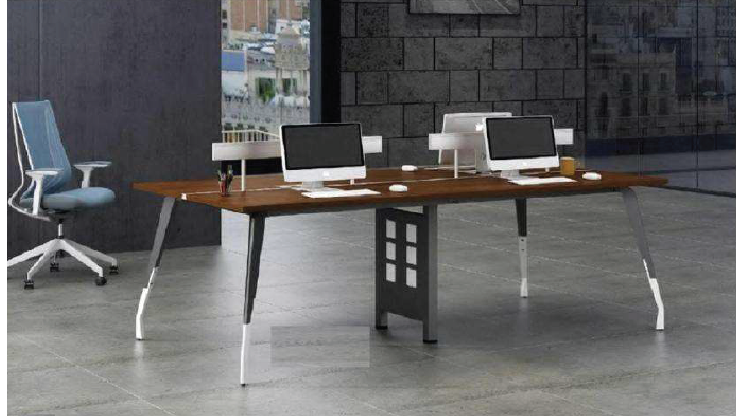Table of Contents
Introduction
In the world of event planning and organization, every detail matters. From the choice of venue to the seating arrangement, every element contributes to the overall success of your event. Among these crucial aspects, the conference hall table plays a pivotal role. In this article, we will explore the significance of a well-chosen conference hall table and how it can elevate your event experience.
The Importance of a Conference Hall Table
A conference hall table is far more than just a piece of furniture; it plays a pivotal role in shaping the overall experience of any event held within a conference or meeting space. Here’s a closer look at why the choice of a conference hall table is a crucial consideration in event planning:

Setting the Tone
The conference hall table serves as the centerpiece of the event space, and as the saying goes, “first impressions matter.” It is often the first thing that attendees notice upon entering the venue. Its design, material, and overall aesthetic set the tone for the entire gathering. For instance, a sleek, polished wooden table exudes elegance and professionalism, making it ideal for corporate meetings and formal events. On the other hand, a more casual event might benefit from a modern, modular table that communicates a relaxed and collaborative atmosphere. The table’s appearance instantly conveys a message about the event’s purpose and level of formality.
Functionality Matters
While aesthetics are essential, the functionality of the conference hall table should not be underestimated. It serves as a practical workspace during the event. A well-designed table provides ample surface area for essential items such as laptops, documents, microphones, and refreshments. An organized and functional table ensures that presenters and attendees have the necessary tools at their fingertips, contributing to a smooth flow of activities and presentations. A cluttered or inadequate table can lead to disruptions and frustrations during the event, detracting from the overall experience.

Types of Conference Hall Tables
When it comes to selecting a conference hall table, there are various types available to suit different event needs and aesthetics. Each type offers unique features and benefits, allowing event organizers to choose the one that best complements their event theme and requirements. Here’s a more detailed exploration of these types:
1. Traditional Wooden Tables
Traditional wooden conference hall tables exude timeless elegance and sophistication. They are often the preferred choice for formal events, such as corporate conferences and upscale seminars. These tables are characterized by their classic design and come in various wood finishes, such as oak, cherry, or mahogany. They can also be customized to match the event’s color scheme and décor. The traditional wooden table adds a touch of professionalism and refinement to any setting.
2. Modular Tables
Modular conference hall tables are prized for their versatility. These tables are designed to be adjustable and easily reconfigured to accommodate different group sizes and seating arrangements. Their modular nature makes them ideal for events that require flexible layouts. Whether you need a U-shaped arrangement for a discussion panel or a long, continuous setup for a seminar, modular tables can adapt to your changing needs. This adaptability ensures that your event space remains functional and efficient throughout the occasion.
3. High-Tech Tables
In today’s digital age, high-tech conference hall tables are gaining popularity. These tables are equipped with built-in technology features that enhance the overall event experience. They may include integrated charging ports for electronic devices, touchscreen surfaces for interactive presentations, and even embedded screens for video conferencing. High-tech tables are perfect for tech-savvy events, providing convenience and interactivity for both presenters and attendees. They can seamlessly integrate modern technology into your event while maintaining a sleek and contemporary appearance.
Each type of conference hall table has its unique advantages, and the choice ultimately depends on the nature of the event, the available space, and the desired ambiance. Whether you opt for the timeless elegance of traditional wooden tables, the adaptability of modular tables, or the cutting-edge technology of high-tech tables, selecting the right type will contribute significantly to the success of your event.

Choosing the Right Conference Hall Table
Selecting the right conference hall table is a crucial decision in event planning, as it can significantly impact the overall success and atmosphere of your gathering. To make an informed choice, you need to consider several important factors:
1. Event Type
The nature of your event should be the first consideration when choosing a conference hall table. Different events require different table styles to align with their themes and purposes. For instance:
- Corporate Events: For formal corporate meetings, conferences, or seminars, opt for sleek and professional conference hall tables. These should exude elegance and sophistication, setting a professional tone for the event.
- Casual Gatherings: In contrast, informal events such as social gatherings, workshops, or networking sessions may benefit from more versatile and relaxed table options. Modular tables that can be adjusted to accommodate different group sizes and seating arrangements work well here.
2. Space Constraints
The size and layout of your event space play a critical role in determining the type and size of the conference hall table you should choose. Consider the following:
- Room Size: In a spacious ballroom or large conference hall, you have the flexibility to use larger tables that can accommodate more attendees comfortably. However, in smaller meeting rooms or intimate settings, a more compact table is essential to avoid overcrowding and ensure that participants have enough space to move around.
- Table Placement: Plan the placement of your tables strategically to maximize space utilization. Ensure that there is sufficient room for chairs, aisles, and any additional equipment or displays you might need.
3. Branding Opportunities
Your conference hall table can be an effective platform for branding and conveying your event’s message. To leverage this opportunity:
- Customization: Consider tables that allow for customization. You can incorporate your organization’s logo, colors, or event theme into the table design. This not only enhances branding but also leaves a lasting impression on attendees.
- Table Accessories: Use custom tablecloths, centerpieces, or branded materials on the table to reinforce your event’s identity and message.

4. Practicality and Functionality
Functionality is key when selecting a conference hall table. Ensure that it can meet the practical needs of your event:
- Storage: Evaluate whether the table provides sufficient storage space for essential items such as laptops, documents, microphones, or refreshments. An organized table contributes to the smooth flow of activities during your event.
- Technology Integration: In the digital age, some conference hall tables come equipped with built-in technology features like charging ports, integrated screens, or connectivity options. Assess whether these technological features align with the requirements of your event.
By carefully considering these factors, you can make an informed decision when choosing the right conference hall table for your event. Remember that your selection should align with the event type, space constraints, branding opportunities, and practical functionality to create a seamless and impactful event experience.
Maintaining Your Conference Hall Table
Maintaining your conference hall table is a crucial aspect of ensuring the success of your events. A well-maintained table not only enhances the overall aesthetics of the event space but also contributes to the functionality and professionalism of the gathering. Here’s a detailed look at how to effectively maintain your conference hall table:
1. Regular Cleaning
Regular cleaning is the first step in maintaining your conference hall table. Dust, fingerprints, and spills can quickly accumulate, affecting the table’s appearance. Depending on the material of your table (wood, metal, or plastic), use appropriate cleaning agents and methods. Here’s a general cleaning guideline:
- Wooden Tables: Dust the table regularly and use a wood-friendly cleaner to wipe away any smudges or stains. Be cautious with water to avoid damage to the wood’s finish.
- Metal Tables: Use a damp cloth with a mild detergent to clean metal surfaces. Dry thoroughly to prevent water spots or corrosion.
- Plastic Tables: Plastic tables are relatively low-maintenance. A mixture of mild soap and water is usually sufficient to clean them. Rinse and dry to avoid streaks.
2. Inspection
Regularly inspect your conference hall table for any signs of wear and tear. This includes checking for loose screws, wobbly legs, or scratches on the surface. Addressing these issues promptly can prevent accidents during events and extend the table’s lifespan.
3. Storage
When not in use, store your conference hall tables properly. If they are foldable or stackable, make sure to fold or stack them securely to save space and prevent damage. Use protective covers or cloths to shield them from dust and potential scratches while in storage.
4. Repair and Refinishing
If you notice any significant damage or wear on your table, consider repairing or refinishing it. Wooden tables, in particular, can benefit from refinishing to restore their original luster. Consult with a professional if necessary, or follow DIY instructions for minor repairs.
5. Table Accessories
To protect your conference hall table during events, consider using accessories like tablecloths, placemats, or coasters. These not only add to the table’s aesthetics but also provide a barrier against spills and scratches.
6. Transport and Handling
When moving or transporting conference hall tables, handle them with care. Use proper lifting techniques to avoid strain, and use dollies or carts to prevent dragging, which can damage the legs or surface.
7. Preventive Maintenance
Implement a preventive maintenance schedule for your conference hall tables. Regularly clean and inspect them, especially before important events. This proactive approach will ensure that your tables are always in top condition when needed.
By following these maintenance practices, you can ensure that your conference hall table remains in excellent condition, ready to enhance the ambiance and functionality of your events. A well-maintained table reflects your commitment to quality and professionalism, leaving a positive impression on event attendees.
Conclusion
Your choice of a conference hall table can significantly impact the success of your event. It sets the atmosphere, provides functionality, and offers branding opportunities. So, next time you’re planning an event, give careful thought to the table that will take center stage.
The diverse array of conference hall table options allows you to tailor your choice to your event’s unique needs. Whether you opt for the timeless elegance of traditional wooden tables, the versatility of modular designs, or the cutting-edge technology of high-tech tables, your selection should align with your event’s purpose and atmosphere.
FAQs
1. Can I rent conference hall tables for my event?
Absolutely! Many event rental companies offer a variety of conference hall tables for rent, allowing you to choose the perfect one for your needs.
2. What materials are conference hall tables typically made of?
Conference hall tables can be made of various materials, including wood, metal, and plastic. The choice depends on your aesthetic preferences and budget.
3. Are high-tech conference hall tables worth the investment?
High-tech tables can be a valuable addition, especially for tech-savvy events. They enhance interactivity and convenience, making them worth considering for certain occasions.
4. How can I incorporate branding into my conference hall table design?
You can incorporate branding through custom tablecloths, logo placement, or thematic table settings that align with your event’s theme.
5. What should I do if my conference hall table gets damaged during an event?
Event rental companies often have contingency plans for damage. Make sure to discuss this with your rental provider before your event to understand the process and potential costs.

